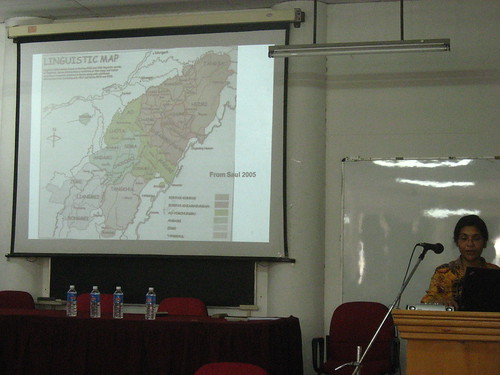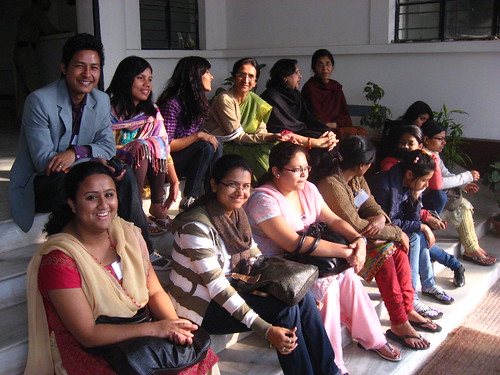Doing linguistic / anthropological fieldwork in any place which isn't your own native environment can be a daunting task. Alhough I wasn't doing fieldwork this week, some of the principles of surviving fieldwork still apply. Many people doing fieldwork have the romantic notion of 'living like the locals' (that's also assuming all 'locals' live the same way which isn't the case), but for a healthy fieldwork experience - and I'm speaking only from personal experience - there are three necessary conditions that need to be met to the satisfaction of the researcher. If these are not met, one should get out of the situation before it takes its psychological toll with the researcher wondering what the heck they're doing there, longing to hide in a room or run away, and basically not getting much research done.
For the sake of alliteration, I'm naming them:
Space,
Stimulation and
Sanitation.
But before I talk about them, here's a little preamble about the events of the past few days which have led me to post on this topic.
So having left Nagaland, I arrived in Diphu in Karbi Anglong - the largest district in Assam - on Tuesday. On Wednesday my friend here invited me to spend a few days with her at a cultural festival organised by one of the main political parties in the district. The festival was taking place at the new 'ethnic village' in Kohora close to the entrance of Kaziranga National Park. Having just left Nagaland, I was up for another adventure. I'm not quite sure what my friend expected was going to happen at the festival, but for me, living arrangements did not meet these 3 Ss.
1. Space
When doing fieldwork, one of the first things to establish is your own space - space to put your things, space to rest, space to hide from the rest of the world whose language and culture you barely understand but are - hopefully - trying to learn. The amount of personal space needed differs from person to person, but generally, a nice secure location, if only to store expensive equipment, is preferred.
For the 3 to 4 days I was going to be at the festival (my friend wasn't certain when we would be coming back), the sleeping arrangement was simple. There were two parts to the model house in the 'ethnic village'. The women were to sleep on the floor in the main part of the house, while the men were to sleep in a smaller section of the house right next to the toilets. During the day, these areas were used for the exhibition area and a baggage storage area respectively. This meant that the sleeping mats were only set up when guests had stopped visiting for the night and they kept early in the morning to prepare for any arriving guests.
3 to 4 days may not sound like a long time and one might say, "It's only a few days, I can suck it up." But imagine having just travelled 4 hours from a different town, arriving in a new place where no one's telling you what's going on. All you want to do is lie down and take a rest, but there's nowhere to do so. You don't know when people are going to bed, and you don't know what time they're waking up. Worse, because you don't speak the language and people don't speak English or may be shy to do so, no one's telling you what's happening, and your friend's busy with her own work and doesn't quite know the situation herself. In fact, 3 to 4 hours is generally more than enough time to get frustrated with the whole set-up.
2. Stimulation
Being in a foreign environment is often an isolating experience. Even if people speak your language, they may have a completely different view of the world, and many conversations don't progress beyond 'Hi, how are you?' or people asking about what you think of their town / village / customs. It's a legitimate question, until everyone you meet asks you the same question every time and you find yourself having to praise even the dullest of locations. It's quite easy to just go into your own internal monologue and shut out everyone around you. It's necessary to have some sort of mental stimulation to avoid this - and not research-related stimulation either. For many, a book to read or a journal to write in might be enough, unless it's too painful to do any reading or writing that isn't research-related.
Being at a cultural festival doesn't guarantee all-day entertainment. After looking at the models of traditional houses at Kohora (and the workmanship really wasn't as good as what I'd seen at the Hornbill Festival at Kisama and at the Agri Expo in Dimapur), there's only so much dancing and singing I could take before calling it a day.
The first evening was probably the worse, because everyone was busy setting up for the exhibition, while I had absolutely nothing to do for about 5 hours. I didn't have a book to read (nor light nor a space to read if I wanted to) and I had no one to talk to. I had visited all the traditional houses (which took about 15 minutes) and there was nothing to watch apart from the long meeting held by the organisers of the festival. Worse, because I didn't have a space to lie down, I found myself pacing up and down like a caged animal. At one point I found a stone block under a pavillion to lie down on, but when I got up, I realised I'd be lying next to a dog the whole time!
3. Sanitation
This is probably the most important to many people. Keeping clean is an important part of feeling happy. Some, like myself, are psychologically prepared not to bathe as often as they are used to when they are in a different environment, especially if it's very cold and hot water comes in buckets (it's the time spent drying off afterwards that really bothers me). Access to a clean toilet is definitely a must, even if it means getting used to squatting and not using toilet paper for some. Also, for researchers in South Asia and other areas with heavily sweetened drinks, daily toothbrushing (and flossing) is essential if you don't want a hefty dental bill when you return home.
Now, between the 20 or so people staying in the house for the duration of the festival, there was one toilet and one bathroom, neither of which had any water. To make things worse, the toilet seat wouldn't stay up, so the guys simply peed on it. Naturally, many of the women refused to pee there so they used the drainage hole in the bathroom instead. The bathroom door didn't have a lock on the inside, so every time my friend went I had to stand guard outside.
Now, I was clearly aware that the sleeping arrangements were well outside my comfort zone. But I was more aware of the psychological trauma of spending 3-4 days in this kind of environment and I wasn't about to be
gungho about the whole thing.
In the end, I only spent one night in the house, on the condition that my friend help me find a way back to Diphu the next day. However, it soon became clear to me that my friend did not want me to leave the next day since she herself felt uncomfortable in this situation - a clear sign that me as a foreigner shouldn't be in that environment. It was only after my mini-meltdown, when a guy I had spoken to for 2 minutes asked for my number simply because I was a foreigner, that she said it would be alright if I left.
In any case, transport back to Diphu that day turned out to be a bit of a problem, but thankfully her boss was able put me up in a hotel close to the festival ground the next day. However, that day I was actually moved no less than four times from one hotel to another (for various reasons), with people simply coming in to the room and telling me to "packing". Such uncertainty is another source of trauma. Also, although my friend's boss's bodyguard always had a cheerful smile on his face, I was always wary of the semi-automatic weapon (I think it was semi-automatic) he had slung over his shoulder.
I finally got back to Diphu yesterday when my friend's brother drove the 4 hours to the festival just for the afternoon.
This photo was taken after my friend had just made all the women move to a different section of the house so I didn't have to sleep with the boys next to the toilets. [UPDATE: the reason why I look so miserable in this photo wasn't because I had to sleep on the floor, it was because I was feeling super guilty that my friend had made all the women move out of the area so I could sleep there.] There was another guy sleeping next to me, so I wouldn't feel too bad.
But did I mention he snored like a dying pig?




